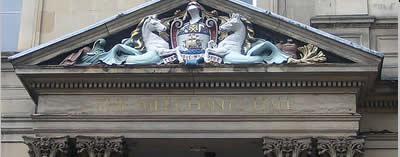The early years
The introduction of Economics to the University degree programme has encouraged students from around the world to explore economy from a diverse range of perspectives.

The eighteenth century was a period when economics was of prominent interest to Edinburgh, particularly as David Hume, James Stuart, Adam Smith and Dugald Stewart were all playing a part in the city's intellectual life.
Dugald Stewart
Edinburgh University began teaching economics in 1800-1801, when Dugald Stewart, who was a professor of moral philosophy, began to give undergraduate lectures in the subject.
Stewart had known Adam Smith, and had written his first biography. In his lectures he proceeded to pursue Smithian themes, although he placed greater emphasis upon the theories of laissez-faire and free trade than on value.
The Chair of Commercial and Political Economy and Mercantile Law
Successive moral philosophy professors continued to teach political economy and in 1864, Principles of Political Economy by John Stuart Mill was adopted as a textbook.
Six years later economics teaching took off when Edinburgh's Merchant Company established the Chair of Commercial and Political Economy and Mercantile Law in 1870.
Those who held the Chair over the following two hundred years include:
- William Ballantyne Hodgson
- Joseph Shield Nicholson
- Frederick Wolff Ogilvie
- Alexander Gray
- Alan Peacock
- Alexander John Youngson
- James Nathan Wolfe
- Ian Stewart
- Gordon Hughes
William Ballantyne Hodgson (1815 – 1880)
William Ballantyne Hodgson was the first professor of Economics at the University of Edinburgh.
Background
Hodgson was born in Edinburgh. He was a studious youth, attending Edinburgh High School and the University. At the age of fourteen, he would read for fourteen hours a day, 'devouring the newest French or German or Italian books'.
Career
He rejected his father's advice to pursue a career in Law, and instead he took to journalism and lectured at the University on literature, education and phrenology.
In 1839, he was appointed secretary to the Mechanics' Institute of Liverpool. For a short time, one of his pupils was William Stanley Jevons, who later wrote Theory of Political Economy. Hodgson was a lifelong advocate of female education; he established a school for girls and encouraged the training of female teachers
Edinburgh
He was principal of Chorlton High School from1847-1851 before returning to a life of journalism and lecturing until he took up the Edinburgh chair in 1871. He is reputed to have told a friend that he feared he had signed his death warrant. He was initially appointed for five years, before he reluctantly accepted a second term of seven years.
Hodgson's political economy lectures did not make up any single degree programme. Nevertheless they were the most popular voluntary classes, with an annual average of fifty students in the years 1871-1879. During this period he was paid a salary of £450 and kept the class fees. Classes originally began at 9am, but this changed to 5 pm in 1876 in order to allow bank clerks to attend after work . In 1902 the class hour reverted to 9, which was how it remained until the 1990s.
Despite the broad title of his chair, Hodgson was predominantly an economics lecturer. He began with a definition of the sphere of economics and vindicated its claim to be a science and gave a brief history of the subject, concentrating on the Physiocrats and Adam Smith. The analytical core of his lectures explored:
- the division of labour
- supply and demand
- capital
- labour
- rent
- value
- money
- banking
On three walls of his lecture room there were diagrams twelve feet tall, which he used to aid his exposition of economics. Most of Hodgson's writings focused on education, but in 1870 he published two lectures discussing Turgot.
Hodgson died in 1880 at an educational conference in Brussels, which was believed to be the result of both his angina and the overwhelming August heat.
His second wife left his large annotated collection of economics books to Edinburgh University Library where, with it resides alongside a substantial portion of Adam Smith's personal library, and is still a major resource for historians of economic thought.

